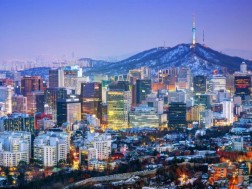The Kingdom of Thailand had political uncertainty after Thailand’s recent general election—with the nation’s opposition parties gaining the most seats in the lower house of parliament. This has caused Thai equities to stumble, putting the kingdom’s stock market among the worst-performing Asian stock markets so far this year. As of writing the SET index trades at 1321 points and the United States listed iShares MSCI Thailand ETF trades at around USD 55 a share.
In a pro-business and pro markets move, Thailand just announced the country will slash by about 50% the personal income tax rate of professionals who are willing to return home to work for companies as the Thai nation seeks to attract manpower for industries ranging from electronics, automobiles, robotics and aviation. The Thai Cabinet cut the income tax ceiling to 17%.
Year-to-date, among the investable universe of kingdom of Thailand stock, the communications sector is the best performing sector , followed by industrials. Utilities and materials so fare are the worst performing sectors of the Thai stock market and economy.
Global investors have offloaded nearly $3.3 billion worth of stocks so far this year, according to Bloomberg data. That’s on track to match last year’s decline, which was the biggest dip since 2020. Global investors added $85 million in exposure to Malaysia, the only country with
year-to-date inflows within Southeast Asia. In Singapore, foreigners trimmed their selling to just a tiny fraction relative to last year, according to EPFR data.
The kingdom of Thailand’s stock market is said to lose its longstanding No. 2 spot in ASEAN stock market capitalization to rivals Singapore and Malaysia, according to data compiled by Bloomberg. Thai stocks typically traded at a premium to their Malaysian counterparts. But in late summer, the average 12-month forward price-to-earnings ratio on the SET Index became cheaper than the FTSE Bursa Malaysia KLCI Index for the first time in nearly four years. The SET now trades at about 13 times compared with 14.1 times for Malaysia.
Thai stock brokers similar to stockbrokers in south Korea have promoted global equities over local equities to local retail investors, interest in the local markets seems low and this could be a contrarian indicator. Smart money investors should focus on valuation and cash dividend yields.
The total value of companies traded on Thailand exchanges was about $440 billion in mid July 2024 , a small lead compared to $426 billion for Singapore and $422 billion for Malaysia, Indonesia’s stock market, valued at about $749 billion, has been the ASEAN region’s largest since late 2021.
Thailand’s precipitous drop is the result of a combination of political and legal flip-flops, weaker-than-expected tourism spending and allegations of corporate misconduct. Those factors have spurred a 14% selloff in the benchmark Stock Exchange of Thailand Index over the last 12 months, the biggest fall among major benchmarks globally.
To revive market confidence, Thailand’s SET has launched a series of new initiatives, including reforms to prevent any market abuses and improve efficiency. Thailand ranks relatively high in the World Bank’s Ease of Doing Business index, reflecting a supportive regulatory environment for businesses and investors.
Some investors seem to be of the opinion that the Thai market could likely remain a value trap until the economic and corporate earnings growth outlook improves and Thai government stimulus packages kick start private consumption.
Thailand’s economy is expected to expand 2.7% this year, faster than the 2.4% estimated in April, according to the nation’s finance ministry, which predicts higher foreign tourist arrivals and spending to support a steady growth in private consumption. Private consumption seen accelerating at 4.5% this year, up from 3.5% pencilled earlier.
The land of Smiles raised foreign tourist arrivals to 36 million this year from 35.7 million it estimated in April, with revenue from travellers expected to clock 1.69 trillion baht, up from 1.59 trillion baht it previously predicted
Thailand is often called the "Land of Smiles" because of the friendly and welcoming nature of its people. The Thai culture places a high value on politeness, hospitality, and maintaining a positive demeanour. Smiling is an integral part of Thai social interactions and communication, often used to convey a wide range of emotions beyond just happiness, such as respect, gratitude, or even to ease tension in uncomfortable situations. This cultural emphasis on smiling contributes to the country's reputation as a warm and inviting destination for visitors.
Wall street and the global investment markets often depend on market narratives, for most or at least many investors today and it has become the buzzword of AI.
In global equities AI increasingly can or will stand for ASEAN & India in terms of asset allocation. And not just artificial intelligence.
Similar to how France and Germany were the architects of the EU European union, it was the island STATE of Singapore and the kingdom of Thailand that created ASEAN. The Association of Southeast Asian Nations (ASEAN) was created on August 8, 1967. It was the ASEAN Declaration (also known as the Bangkok Declaration) that established the organization.
While Thailand has experienced periods of political instability in the past, recent years have seen efforts towards greater political stability and economic reforms aimed at creating a more favourable business environment.
With a population of over 70 million and rising middle-class income, Thailand presents a growing consumer market with increasing demand for various goods and services. And hence attractive opportunities for patient capital.
Thailand is a leading global tourist destination, and the tourism sector significantly contributes to GDP. Investments in hospitality, retail, and travel services offer growth potential.
Thailand Sees Higher Growth as Tourism Recovery Gains. Thailand has seen the number of foreign tourist arrivals top 20 million this year, according to Prime Minister Srettha Thavisin.
Investors can benefit from tourism stocks listed on the stock exchange of Thailand. Chinese tourists accounted for nearly 4 million arrivals, followed by visitors from Malaysia, India, South Korea and Russia. BH bumrungrad Hospital PCL is the 4th best performing Thai stock and has a dividend yield of 3.15% and a PE of 26.32 x. the 12-month analyst community TP Target Price, currently stands at THB 289 which implies (potential) gains of +17.5% from current levels. Legal disclaimer: analysts’ views can always be wrong or too early but it’s important to understand the underlying assumptions.
Medical services providers and hospital stocks are among the best performing stocks on the SET stock exchange of Thailand, according to Bloomberg and Stock exchange of Thailand data.
Thailand’s biggest private hospital operator Bangkok Dusit Medical Services Public Company Limited expects annual revenue to grow more than 10% through 2027 as it adds new beds to meet a jump in demand from international patients. BDMS trades at a P/E of 26.5x and a dividend yield of 2.64%. the analyst community consensus rating stands at BUY 92.9% hold 7.1% and sell 0%. The 12-month average analyst target price of THB 34.98 implies (potential) gain of +32% from current levels. Seasoned investors might want to re-call the timeless wall street adage ”just because it is consensus does not necessarily make it wrong”.
There is a lot of growth potential for medical tourism from overseas markets with lower costs of living and medical treatments in Thailand. Prime Minister Srettha Thavisin has rolled out a roadmap to cement Southeast Asia’s second-biggest economy as the region’s tourism, wellness and medical hub. The government plans to approach foreign governments and health insurers to send more patients for medical treatment to Thailand. The effort is part of the health ministry’s 10-year medical-centre plan, which will be submitted for cabinet approval soon the Stock Exchange of Thailand (SET) plays a crucial role in the country's economy and the broader Southeast Asian financial landscape. The SET100 index is trading at a valuation of P/E 14.2 x and a dividend yield of 3.36%.
THB retail bank deposit rates are currently 1.7% to 2% for 12 month or 24-month FD fixed deposits. SCB Siam commercial bank with a current P/E of 8x, is one of the kingdom’s leading banks. The bank’s 12-month dividend yield in baht is currently 10% and the next ex-dividend date is 09/02/24 the current analyst consensus view on the stock of SCB is buy 50% hold 39.3% and sell 10.7%. the 12-month TP target price of THB 111.48 implies potential return of +8.2% from last Friday’s closing price on the Bangkok stock exchange. Yuanta securities and its analyst Irin Sittsisawad is among the most bullish analysts on the stock with a target price of THB 125 per share.
BBL or Bangkok Bank as a key competitor to SCB is trading at 6 PE and a dividend yield of 5.15%. 12-month analyst rating imply potential gains of 22.3% from current level. Kasikornbank, the old Thai farmers bank trades at PE 6.48 x and a dividend yield of 5.08% 12-month analyst ratings imply potential gains of +17% from current levels.
The SET attracts local and international investors, providing them with opportunities to invest in a variety of financial instruments, including stocks, bonds, and other securities. This allows investors to diversify their portfolios and participate in the growth of Thai companies.
As of January 1, 2024, there are 908 public listed companies on The Stock Exchange of Thailand (SET)1. These companies span various sectors and industries, contributing to the vibrant economic landscape of Thailand.
Thailand is strategically located in the heart of Southeast Asia, making it a gateway to the region. Its proximity to major Asian markets provides opportunities for trade and business expansion.
Thailand has developed infrastructure, including well-maintained roads, ports, and airports. The government has also been investing in improving infrastructure to support economic growth.
Despite periodic political changes, Thailand has generally experienced political stability, which is crucial for attracting long term foreign investment. A stable political environment is generally conducive to long-term business planning.
Thailand has a relatively skilled and cost-effective workforce. The country has invested in education and skills development, particularly in industries such as technology, manufacturing, and services.
Thailand has a relatively skilled and cost-effective workforce. The country has invested in education and skills development, particularly in industries such as technology, manufacturing, and services.
Economic Diversity: Thailand's economy is diverse, with strong sectors such as tourism, manufacturing, agriculture, and services. This diversity can provide resilience in the face of economic uncertainties.
The Thai government offers various investment incentives to attract foreign investors, including tax incentives, exemptions, and other support measures, especially in sectors like technology and renewable energy.
Thailand is a popular tourist destination, and the tourism industry contributes significantly to the economy. For investors involved in hospitality, entertainment, and related sectors, the tourism industry can provide attractive opportunities.
In the fixed income markets and international issuances, Thailand plans to regulate the sale of baht- denominated bonds by foreign entities to shield local investors, a move that risks driving away borrowers from Laos and Myanmar. Under a new set of rules proposed by the Securities and Exchange Commission, overseas sellers of baht bonds will be required to have their new securities rated by international credit rating companies for both private and public offerings.
it's essential to conduct thorough research and consider potential challenges, such as regulatory changes, currency risk, and market competition, before making any investment decisions. Consulting with financial advisors and industry experts can provide more tailored advice based on specific investment goals and preferences.
Political uncertainty after Thailand’s recent general election—with the nation’s opposition parties gaining the most seats in the lower house of parliament—has caused Thai equities to stumble, putting its stock market among the worst-performing Asian exchanges so far this year. Thai voters and global investors are looking for a stable new government and clear economic policies, including debt-restructuring measures, for sustainable growth and to bring smiles to investors in THAI equities.
In summary, Thai equities offer a compelling investment case at current valuations due to the country’s economic growth, sectoral strengths, strategic location, and supportive government policies. However, investors should also be mindful of potential risks such as political instability and global economic dependencies.
Investors are encouraged to conduct thorough due diligence, seek professional advice, and consider their risk tolerance before making any investment decision in the kingdom of Thailand or in a portfolio context. Past performance is not indicative of future results, and investments can lose value. This article is for informational purposes only and does not constitute investment advice or an endorsement of any investment strategy or single security.
Rainer Michael Preiss is Partner & Portfolio Strategist at Das Family Office in Singapore
















